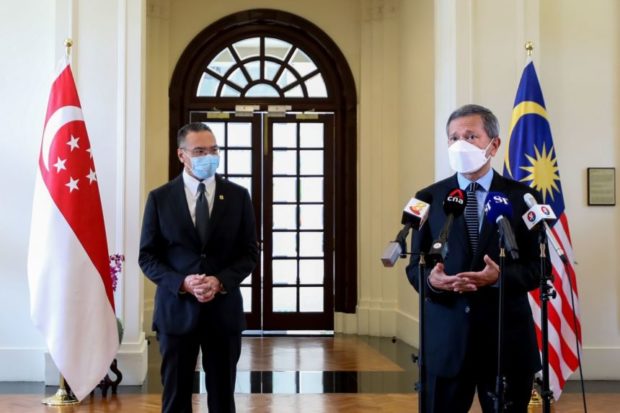
Minister for Foreign Affairs Dr Vivian Balakrishnan (right) and Malaysian Minister of Foreign Affairs Dato’ Seri Hishammuddin Tun Hussein speak to the media after their meeting in Singapore, on May 2, 2021.PHOTO: MINISTRY OF FOREIGN AFFAIRS, SINGAPORE
SINGAPORE — Travel on compassionate grounds between Singapore and Malaysia will be allowed from May 17, amid Covid-19 restrictions that ban the bulk of cross-border movement.
The details of such travel arrangements will be released later, but these will include steps like testing visitors for the coronavirus as well as the need for quarantine, said Foreign Affairs Minister Vivian Balakrishnan on Sunday (May 2).
Dr Balakrishnan made the announcement together with his Malaysian counterpart, Datuk Seri Hishammuddin Hussein, who was on a two-day official visit to Singapore till Sunday.
Mr Hishammuddin said that the compassionate grounds would refer to situations when people on either side request to make trips across the border to be with those who are critically ill or to attend funerals.
Dr Balakrishnan said that the move is necessary due to the “extensive ties” that the two countries share.
“When a family crisis occurs, people want to get together. And therefore, bearing in mind this very special close relationship between the people of Singapore and the people of Malaysia, it is necessary to have schemes like this,” said Dr Balakrishnan.
“So we’ll announce further details on the types of tests and quarantine arrangements which will be necessary in order to operationalize this scheme.”
Details of the procedures and entry requirements will be released by the respective authorities of each country, namely the Department of Immigration of Malaysia and the Immigration and Checkpoints Authority (ICA) of Singapore.
The two leaders also discussed a potential air travel bubble between Singapore and Malaysia, and Mr Hishammuddin said that in order to proceed, further negotiations with the transport ministries of both countries will be required.
They also talked about mutually recognizing vaccine certificates to facilitate cross-border travel in the future, which will be done digitally, noted Mr Hishammuddin. He added that for such travel to happen, the digital contact tracing tools of both countries would need to be compatible with each other.
A joint statement from the two ministers on Sunday said that they welcomed an agreement reached by the Singapore Smart Nation and Digital Government Office and the Malaysian Ministry of Science, Technology and Innovation on the mutual technical verification of health certificates issued in Singapore and Malaysia.
The move to allow travel on compassionate grounds is the latest in a series of agreements that the two countries have made to cope with the effects of Covid-19.
Other such moves include ongoing efforts to progressively restore cross-border travel for other groups of travelers, in addition to the Reciprocal Green Lane (RGL), which had been suspended since February, and the Periodic Commuting Arrangement (PCA). Mr Hishammuddin said that these were discussed on Sunday as well.
Under the PCA, approved travelers must remain in their country of employment for at least 90 days before returning to their home country for short-term home leave.
Such travelers can cross the border only at the Causeway and Second Link. Upon entering Singapore, they must serve a 14-day stay-home notice before being swabbed for the virus.
The RGL between Singapore and Malaysia is meant to facilitate short-term essential business and official travel between the two countries. It allows for travel of up to 14 days, and those under it must follow a strictly controlled itinerary. For instance, they cannot use public transport except for private-hire cars and taxis.
In their joint statement, the ministers expressed their satisfaction that despite the challenges faced during the Covid-19 pandemic, bilateral relations and cooperation remained intact and strong, as demonstrated by the uninterrupted movement of goods between both countries.
Dr Balakrishnan pointed out that Singapore and Malaysia have never completely closed off their borders, and still allowed essential supply chains carrying medication, food and other supplies to flow.
This is due to the very special relationship between Singapore and Malaysia, especially Johor, and why special arrangements such as allowing for visitors on compassionate grounds have been made.
“Even as the Covid-19 pandemic continues to challenge both our countries, rest assured we will work very closely together, we will support each other, and our people-to-people ties will be protected and will be nurtured,” he said.